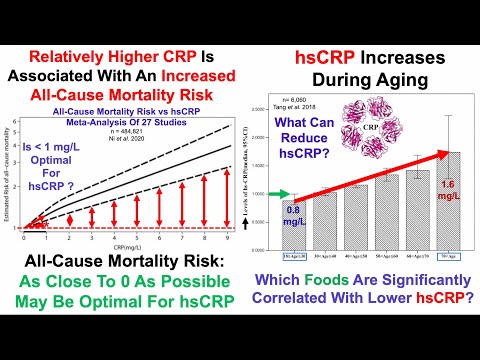Very interesting! Mine was 0.8 recently and I’m thinking I had some residual inflammation from having inadvertent gluten exposures 3 days per week for a couple months due eating at work. Supposedly it takes about 2 months to lower the inflammation after gluten ingestion in celiac. I only waited 3 weeks to get my labs after figuring it out so I’m hoping my next test will be improved.
CRP has two main sources. Infection which should be temporary and Senescent cells (through IL-6 in SASP) which you really want to reduce. Hence you want to find your low point in terms of CRP over a period of time and aim to reduce that.
A temporary increase through infection is just one of those things. The infection is a nuisance, but there is no long term problem.
Also be careful because sometimes in the USA it is measured in mg/dL rather than mg/L
.
Check for infection first and foremost, you don’t want an infection running amock leading to sepsis.
Especially important for rapa users?
True, but 0.8mg/L is not particularly high. 8mg/dL is quite high, however.
Bacterial infections are usually pretty easy to spot. High fever and/or painful/red/swollen body part/skin. And rapamycin has a boosting effect on T cell responses in the face of pathogen infections and vaccines too. What we know from transplant or cancer patients is not really all translatable to healthy individuals since they usually take multiple other drugs that affect immune system too. It is more complex than just saying taking rapamycin weakens immune system. More correct would be to say it changes the immune response.
Some people can miss having a fever, especially elderly, it depends on perception ability/cognition, but of course it is rare. I miss often temperature deviations that my Oura ring picks up, or it detects it faster than myself. I also wonder how long fever are if the infection couldn’t be dealt with? Does the fever stop and the infection persist?
Individual variation, hence CRP etc is important to look at but not excluding other things like body temperature. I also think CRP causally increases risk of heart disease (because of its association to IL-6 and measurement for it).
Bryan Johnson takes his temperature every morning, that might to check his metabolism rate, for his caloric restriction, or maybe it’s to check for fever?
I don’t think CRP causes an increase in heart disease. I think it indicates the burden of senescence cells which amongst other things causes heart disease (and other diseases of aging).
